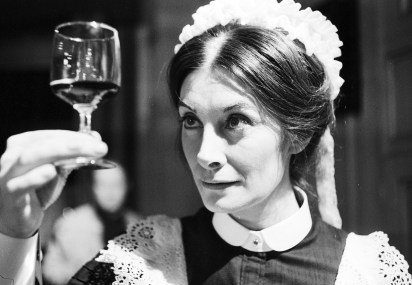Jean Marsh – A Pioneering Talent in British Entertainment
Jean Marsh is a name synonymous with elegance, intelligence, and artistic innovation. Best known for co-creating and starring in the iconic British television series Upstairs, Downstairs, Marsh has carved out a legacy that few actors in the United Kingdom can rival. With a career spanning over six decades, Marsh has not only made her mark as a performer but also as a writer and creative force behind some of the most influential dramas in television history. Her work has shaped the way period drama is presented on screen, influencing generations of viewers and creators alike.
In this in-depth look at her life and career, we will explore how Jean Marsh rose from humble beginnings to become a cornerstone of British culture, examine her most memorable roles, and highlight the unique contributions that have earned her a revered place in television history.
Early Life and Introduction to the Performing Arts
Humble Beginnings in London
Jean Lyndsey Torren Marsh was born on July 1, 1934, in Stoke Newington, London. Raised in a working-class family, Marsh developed an early interest in performance and storytelling. She studied at the Royal Academy of Dramatic Art (RADA), one of the most prestigious acting schools in the United Kingdom, where she refined her craft and prepared herself for a career on the stage and screen.
Her early life in London gave her first-hand insight into the class distinctions that would later form the backbone of Upstairs, Downstairs. As a young woman living in post-war Britain, Marsh was deeply aware of the evolving social structures and shifting dynamics of the British class system. These formative experiences would later serve as the inspiration for her most groundbreaking work.
Early Roles in Theatre and Television
Marsh began her acting career in the 1950s, performing in theatre productions and landing minor roles in early television dramas. During this time, British television was still in its infancy, and Marsh became one of the many young talents helping to shape the medium. She appeared in various anthology series, including Armchair Theatre, which was a breeding ground for experimental drama and socially conscious storytelling.
Her appearances were often marked by a quiet intensity and an ability to bring depth to even the smallest roles. These early performances earned her a reputation as a serious and committed actress with significant potential.
The Breakthrough: Upstairs, Downstairs
The Birth of a Landmark Series
In 1971, Jean Marsh co-created Upstairs, Downstairs alongside fellow actress Eileen Atkins. The series, which chronicled the lives of a wealthy London family and their domestic servants during the early 20th century, was revolutionary for its time. Marsh also starred in the show as Rose Buck, a devoted maid who served as the emotional anchor of the series.
The idea for Upstairs, Downstairs stemmed from Marsh and Atkins’s mutual fascination with the Edwardian era and its rigid social hierarchy. Unlike many period dramas that focused solely on the aristocracy, Upstairs, Downstairs portrayed both the “upstairs” gentry and the “downstairs” servants, offering a nuanced perspective on class and culture.
The show was a phenomenal success, both critically and commercially. It ran for five seasons, won numerous awards including several Emmys, and was syndicated in over 70 countries. Marsh’s portrayal of Rose was central to the series’ success. With a blend of quiet dignity and emotional vulnerability, she brought humanity to a role that could have easily been a one-dimensional stereotype.
Awards and Recognition
Marsh received widespread acclaim for her work on Upstairs, Downstairs, winning the 1975 Emmy Award for Outstanding Lead Actress in a Drama Series. This was a monumental achievement, not only for Marsh personally but also for British television, which was beginning to gain international recognition thanks to such quality programming.
In addition to her Emmy, Marsh received a BAFTA nomination and numerous other accolades for her performance. Her success opened doors for other British productions in the U.S. and helped pave the way for future series like Downton Abbey, which owes much of its DNA to Upstairs, Downstairs.
Beyond Upstairs, Downstairs: Diverse Roles and Continued Impact

Film and Television Appearances
While Upstairs, Downstairs was her most defining work, Jean Marsh’s career extends far beyond that one landmark show. She appeared in several notable films including Frenzy (1972) directed by Alfred Hitchcock and The Eagle Has Landed (1976), further showcasing her versatility as an actress.
She also appeared in cult television shows such as Doctor Who, where she played multiple roles, including the time-traveling companion Sara Kingdom. Her performances in Doctor Who are still remembered fondly by fans of the long-running series, demonstrating her range and appeal across genres.
Return to Upstairs, Downstairs and Legacy Projects
In 2010, nearly four decades after the original series aired, the BBC revived Upstairs, Downstairs for a new generation. Marsh reprised her role as Rose Buck, now older and wiser, navigating a Britain transformed by two world wars. Although the revival only lasted two seasons, Marsh’s return was met with enthusiasm and respect from critics and audiences alike.
This return also cemented her status as a bridge between the golden era of British television and the modern age. Her presence served as a reminder of the original series’ groundbreaking qualities and enduring relevance.
Jean Marsh as a Writer and Creative Force
Championing Female Voices in Television
Jean Marsh was not just a performer—she was a visionary writer and storyteller. Alongside Eileen Atkins, she broke new ground as a female creator in a male-dominated industry. The success of Upstairs, Downstairs proved that women could not only star in but also develop, write, and produce hit television series.
Marsh continued to write for television and stage, advocating for stories that explored complex characters, especially women navigating rigid societal roles. Her work consistently emphasized empathy, social awareness, and historical context—qualities that made her storytelling both powerful and enduring.
Influence on Future Generations
Marsh’s influence can be seen in the work of later writers and producers like Julian Fellowes, creator of Downton Abbey. Fellowes has often acknowledged Upstairs, Downstairs as a key inspiration, and the comparisons between the two series are frequent and justified. Marsh helped redefine what period drama could be—intimate, political, and emotionally rich.
Awards, Honors, and Lasting Recognition
Over the course of her career, Jean Marsh has been recognized with a variety of honors that speak to her contributions to the arts. In addition to her Emmy win, she was appointed an Officer of the Order of the British Empire (OBE) in 2012 for her services to drama.
Her work is regularly revisited in retrospectives, and her performances continue to be studied by students of acting and television history. Marsh’s unique ability to blend performance with production—a rare combination—makes her a true pioneer in her field.
Personal Life and Reflections
Though Marsh has largely stayed out of the tabloid spotlight, her personal life has occasionally drawn attention, especially during her marriage to actor Jon Pertwee (best known as the Third Doctor in Doctor Who). The marriage was short-lived, and Marsh has spoken candidly in interviews about the challenges of maintaining personal relationships while pursuing a demanding career.
In later years, she has remained active in the arts community, occasionally appearing at conventions, literary events, and interviews, offering insights into her remarkable journey. Even in her 80s, Marsh carries the same poise and thoughtful demeanor that made her a star decades ago.
Conclusion
Jean Marsh’s contribution to British television cannot be overstated. As an actress, she brought to life some of the most memorable characters in television history. As a writer and creator, she broke barriers and set new standards for storytelling, particularly in the realm of period drama. Her work on Upstairs, Downstairs remains a blueprint for how to portray complex class dynamics with sensitivity, intelligence, and dramatic depth.
But beyond the awards and accolades, what truly sets Jean Marsh apart is her vision. She saw the potential for television to do more than entertain—to reflect, to challenge, and to inspire. In doing so, she not only enriched the medium but also paved the way for future generations of artists.
In a landscape often driven by trends and fleeting fame, Jean Marsh stands as a testament to the power of creativity, perseverance, and authenticity. Her legacy endures, not just in the episodes of Upstairs, Downstairs, but in the very DNA of British drama.
Read more: Ellie Costello: Rising Star of British Journalism and Voice of the People


